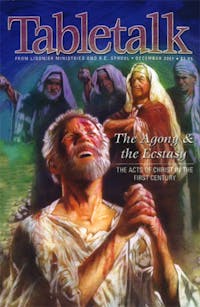
Request your free, three-month trial to Tabletalk magazine. You’ll receive the print issue monthly and gain immediate digital access to decades of archives. This trial is risk-free. No credit card required.
Try Tabletalk NowAlready receive Tabletalk magazine every month?
Verify your email address to gain unlimited access.
In the beginning God created.…” These five words, the first ones in the Bible, are like a blaring trumpet blasting the ears of secular naturalists, for they assert three foundational truths on which the children of postmodernism always choke. This triad of truths sets the stage for the entire Biblical history of redemption. These truths are: There is a God, the universe was created by God, and history had a beginning in time.
The issues of God’s existence and His creation of the universe are paramount points of conflict with all forms of naturalism. These issues, though worthy of close attention, are beyond the scope of this article. I want to focus on the third point, the truth that the universe had a beginning in time. This reduces my concern from the first five words of the Bible to the first three: “In the beginning.…”
In the conflict between Christianity and naturalism, the popularity of “big bang” cosmology would seem to force agreement on the point of the universe’s having a beginning in time. It is usually argued that the big bang, by which all the energy and matter of the universe exploded from a compressed, infinitesimal “point of singularity,” occurred sometime 12 billion to 17 billion years ago (give or take a billion). However, lurking beneath the surface of the theory is the idea that something antedated the beginning, that matter and energy pre-existed the explosion, as far back as eternity. Thus, for some naturalists the big bang does not really describe the beginning as such, merely a radical change in the form and structure of reality for which there is no beginning.
In the ancient world, the Hebrew assertion of a beginning was somewhat radical. The favorite theory of history, embraced particularly (but not exclusively) by Greek philosophers, was the cyclical view. In this view, history is neither linear nor progressive. Rather, it goes around and around in a never-ending circle. It has no point of origin or any specific point of destination. This often is seen as a schema wherein there is no purpose to history. This pessimistic view is explored and countered in the book of Ecclesiastes. The refrain, “Vanity of vanities, all is vanity,” describes a view of history wherein the sun sets and rises, but nothing new appears “under the sun.”
Against cyclical theories of history stands the Judeo-Christian view of a linear-progressive history that has a specific starting point and a future consummation. This assertion is crucial not only to the conflict between Christianity and naturalism, but to critical theories of Biblical interpretation.
Rudolf Bultmann’s neo-gnostic approach to theology was the most influential view of the second half of the twentieth century. He distinguished between the presence of history and myth in the Bible. Working from a naturalistic framework, he denied all things miraculous in the Biblical narrative. In his view, miracles were the mythical husk that needed to be peeled away to reach the kernel of historical truth. It did not bother Bultmann’s understanding of faith to say that the Bible was filled with mythology in its quasi-historical narratives. He sought to construct a theology of timelessness. For him, salvation is not wrought within the boundaries of history. Rather, it is “supra-temporal” or “trans-temporal.” The supra or trans realm is that which is above the realm of history and is not contained within it. Bultmann argued for a salvation that takes place in the “here and now,” on a vertical existential plane, not the horizontal plane of history. In this scheme, the historical content of the Bible doesn’t need to be true in the factual sense. In the final analysis, it doesn’t even matter if there was a historical Jesus.
Swiss Biblical scholar and historian Oscar Cullmann wrote against this radical violation of Biblical Christianity. By examining the time-frame references of the Bible, Cullmann concluded that Biblical Christianity is unintelligible apart from its historical context. The Hebrew-Christian view of history is tied to Judeo-Christian faith. Christianity is about a God who creates history, governs it, and works out His plan of salvation in it. To rip the content of me Bible from its historical context is not to rescue it from naturalistic philosophical criticism but to surrender it to philosophical naturalism. A Christian naturalism is an oxymoron.
Cullmann noted the difference between two Greek words for “time,” chronos and kairos. Chronos refers to the normal moment-by-moment passage of time, to normal history that is “chronicled.” Kairos refers to a specific moment in time that is especially significant. A kairotic moment defines the significance of the past and the future. We approximate this distinction by the English words historical and historic. Everything that happens is historical but not everything is historic. However, everything that is historic is also historical in that it takes place within history. Thus, the kairotic moments of which the Bible speaks are not moments out of time; they take place within the context of chronos.
In God’s eternal purpose, Jesus’ birth took place in the “fullness of time.” God had governed history in preparation for that kairotic moment, which happened in real history. Christianity stands or falls with that real history.
